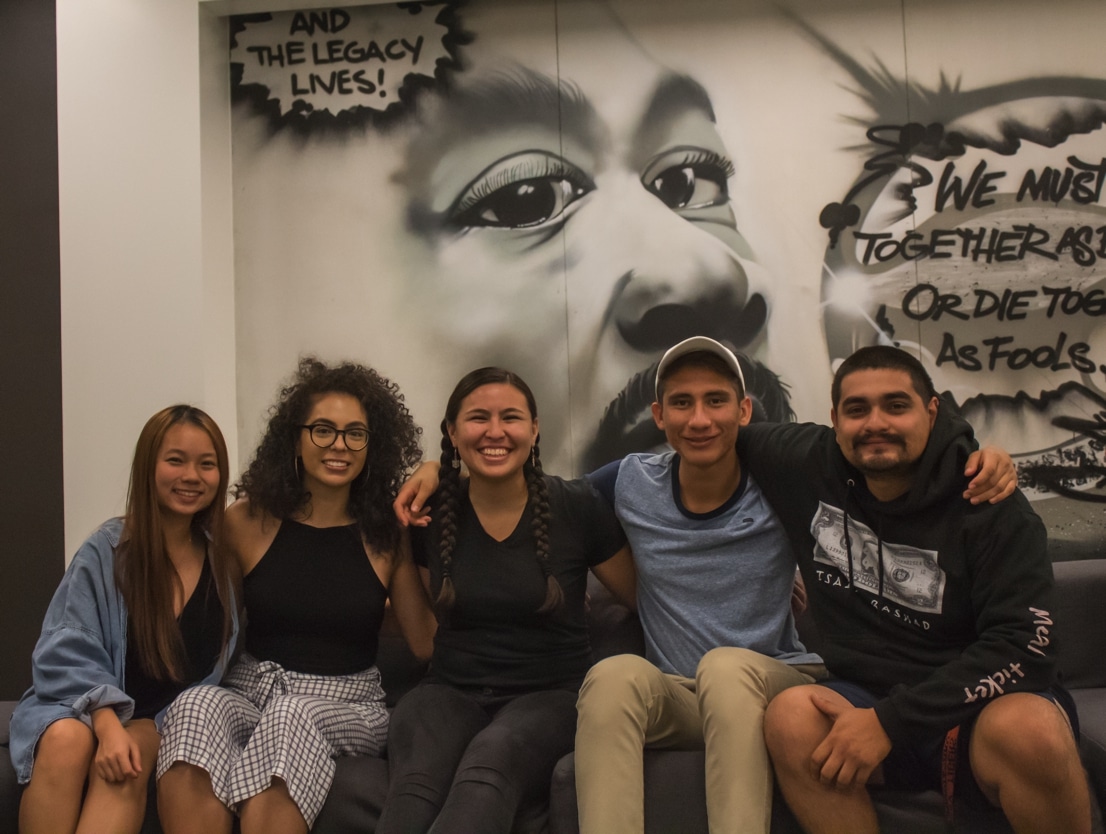In 2013, Rachel Martino ’14 began Occidental’s First Gen Club in order to support students who are the first in their family to attend college. The club aids students successes by connecting first-generation students with campus departments and peer support systems during their club meetings. According to the Occidental admissions website, 15 percent of Occidental students are first-generation college students. From attending the Fall Career Fair together as an organization to winning the Homecoming spirit booth competition, First Gen Club provides students academic and social support in an inclusive environment created by first-generation students for first-generation students.
First Gen Club began the academic year with a barbecue during orientation to help introduce students, their families and faculty to the organization. President of First Gen Club, Joscelyn Guzman (senior), said that membership has increased with current meeting attendance averaging around 30 people. Guzman attributes the growth to the club creating an interactive space early in the academic year.

“Students on this campus, I feel, are unaware of first gen identities broadly, so they don’t check their privilege in having family or people they can turn to who do know about college,” Guzman said. “If you talk to a lot of first-gen students you’ll hear a lot of different stories, but a similar theme that you see is a lack of knowledge of resources or not knowing how to access them.”
Currently, First Gen Club is working to promote visibility among first-generation individuals through their upcoming sticker initiative. First-generation students and faculty who were also first-generation college students will have stickers on their water bottles, laptops and doors to encourage students to reach out to professors who share similar experiences. According to Guzman and Melissa Morales (junior), communications director of First Gen Club, the sticker initiative will act as a mode to promote dialogue between students and faculty.
“We are focused on building that network of faculty who are first gen and staff who are first gen with students who are first gen,” Guzman said. “We can all build that community in a small informal way.”
Bianca Fonseca Cervantes ’14, a first-generation college student, was inspired to write her senior comprehensive project (comps) on “Participation of First Generation Students in High Impact Practices at Liberal Arts Colleges,” after attending a diversity committee meeting in 2012. Fonseca Cervantes was surprised by the low participation rates of first-generation students in High Impact Practices (HIPs). In her comps, Forseca Cervantes explains that HIPs, such as undergraduate research, studying abroad, internships and service learning, connect students to applied learning experiences outside of the classroom and strengthen students’ college experiences. She also advocates for equipping first-generation students with information about on-campus resources that engage students with HIPs.
“Most of the respondents shared that they struggled academically, socially and emotionally as a first-year student and that they did not have the same social and cultural capital as some of their peers whose parents did go to college,” Fonseca Cervantes said in her comps.
Now an alumna, Fonseca Cervantes’s advice for current first-generation students is to reach out to organizations, despite the initial challenges they may face.
“It’s helpful to have other people who have experienced these things to share them with you and also encourage you to participate,” Fonseca Cervantes said. “I think it can be scary sometimes because you are first gen.”
Rhonda Brown, chief diversity officer and vice president for equity and inclusion, addressed the difficulties of first-generation students who may not be familiar with the various ways to access support on campus.
“You don’t know what you don’t know,” Brown said. “It’s more from my standpoint about understanding how to get the most out of Occidental, understanding what support mechanisms are necessary for [first-generation students], and just being that network to catch them so they don’t stumble.”
The Intercultural Community Center (ICC) is another resource for first-generation students and other underrepresented groups on campus. Located at 1501 Campus Road, the ICC allows underrepresented student groups, like First Gen Club, to conduct programming events, study and have a space of support, according to Brown.
John Nguyen, assistant director of intercultural affairs, echoed Brown’s sentiments.
“I want first-gen students to know that we are here for them and we will do whatever we can to help them,” Nguyen said.
Guzman and First Gen Club view this year’s recent uptick in membership as a positive note as they continue to plan movie screenings, host informational workshops with Emmons Wellness Center and the Financial Aid Office and launch their sticker initiative.
“I hope that with [First Gen Club] becoming a larger organization, more people will be empowered to identify as first gen as a point of pride and that it will be something more people are aware of,” Guzman said.
First Gen Club can be reached through email at firstgen@oxy.edu, on Facebook at First Gen at Oxy and on Instagram @oxyfirstgenclub. The ICC is open Monday to Thursday 9 a.m.–10 p.m. and Sunday 1:30–10 p.m.
![]()































